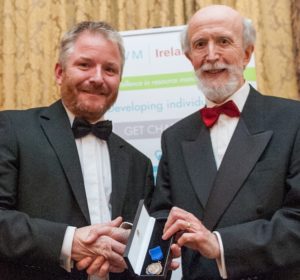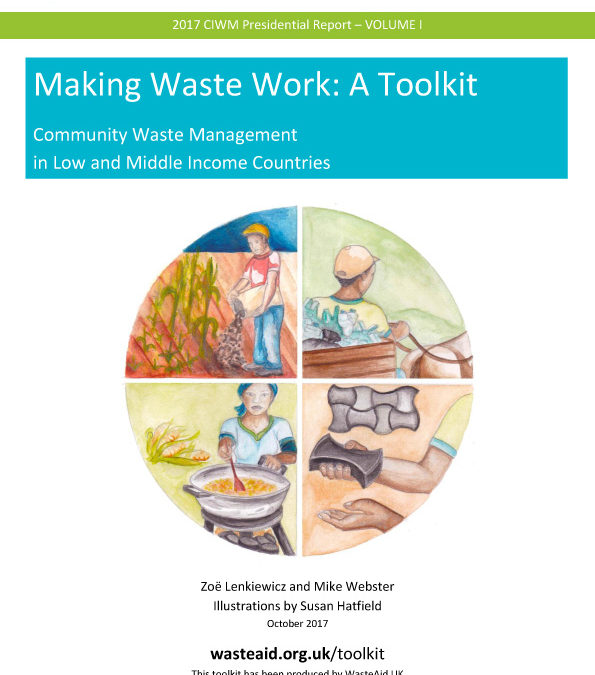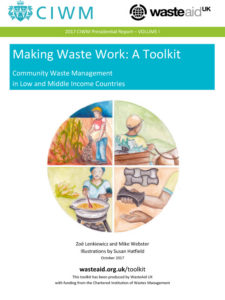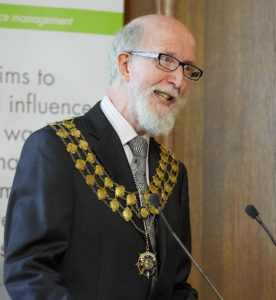28 January, 2019 | Publication, Resource and waste management
Professor David C Wilson has been working for the last two years with the Rwandan academic Telesphore Kabera to apply the Wasteaware indicators to benchmark performance of the solid waste management (SWM) and recycling system in Kigali, the capital of Rwanda. Their results form the basis of a paper published today in the first ever open access issue of the long established ISWA peer-reviewed journal Waste Management & Research. The paper uses previously unpublished results from the Wasteaware database to compare Kigali’s performance with four other East African capital cities – Dar-es-Salaam, Kampala, Nairobi and Maputo.
http://worklife.wharton.upenn.edu/sildenafil-online/
The Wasteaware benchmark indicators grew out of work originally carried out for UN-Habitat’s Soild Waste Management in the World’s Cities (2010). They provide a standardised method to characterise the performance of a city’s SWM and recycling system across some 15 indicators, some quantitative and some qualitative, covering both waste generation, the physical aspects of waste and resource management, and various governance aspects. Results for the first 40 cities were used extensively in UNEP and ISWA’s inaugural Global Waste Management Outlook (2015). They are now being applied widely, both to characterise the baseline position in a city; to identify priority areas for improvement; and to monitor progress over time.
From this paper on East Africa, the stand-out result is the relatively high collection coverage achieved in two of the cities: in Maputo with extensive international technical assistance, and in Kigali using its own local resources. In both cases, governance factors are key. Kigali uses a public-private partnership (PPP), with exclusive franchises in 35 sectors being tendered every three years; households pay an affordable fee depending on their ability to pay (the service is free to the poorest category); 95% fee collection rates are achieved, partly through co-collection with charges for local security patrols, which is a service people value highly given the recent history of the country.
Another key priority to improve solid waste management across East Africa is to eliminate open dumping – only Kampala currently has an engineered disposal site. Recycling rates also need to be increased – only Nairobi currently has a good baseline to build on (30%). Common weaknesses include a lack of segregation at source; and of institutional capacity and of available and reliable waste data.
14 November, 2018 | Awards, Resource and waste management

DCW hands over his CIWM Presidential Medal for 2018 to Mike Webster
https://www.babyscanclinic.com/blog/buy-cialis-tadalafil-online-20-mg/
At the CIWM Presidential Dinner at the Intercontinental Hotel in Dublin, after the inauguration of Enda Kiernan as the next President, DCW’s last act as the retiring President was to award his CIWM Presidential Medal for 2018. The recipient was Mike Webster, the founder and CEO of the new charity Wasteaid, which is working directly with local communities in some of the least developed countries to tackle the global waste crisis. The text of DCW’s speech is reproduced below.
‘Being able to award the President’s Medal is one of the perks of being President, and indeed the only thing that is expected of you after you hand over the chain…. The standard advice is to give it to someone who has particularly helped in my career or in my Presidential year.
I started out in 1974, so my early influencers are now either quite old or have already moved on to the great Circular Economy in the sky.
Looking back on my career, one of the aspects I take most pride in is the number of (then) young people whom I have either brought into the resource and waste sector, or to whose development I have made some contribution; and who I hope won’t be offended if I refer to them, tongue in cheek as, at least in part, my “protégées”.
I am also aware that, in the twilight of my own career, I am leaving behind much unfinished business. So, my thoughts here have gone to one of those protégées, whom I believe can take forward, and make a difference in, an area that is close to my heart. I devoted at least 20 years of my life to working with international organisations, national governments and large cities to develop integrated and sustainable waste management systems.
I have recently drawn attention to the global waste crisis, the more than 3 billion people worldwide who still lack access to basic solid waste management services, which reinforces the comparative failure of such top down approaches; yes, we have made some progress, but it is painfully slow, and corruption often impedes progress. So, I have come to the realisation that, in parallel, we also need to work from the bottom up.
This person is already making an impact, by opening-up opportunities for you and me, as individual resource and waste management professionals and as companies, to get involved and to make a real difference by helping local communities in some of the poorest countries to help themselves by making products to sell locally from the low value organics and plastics in the waste – thus helping to solve their local waste problems, keeping plastics out of the oceans AND giving themselves sustainable livelihoods to feed and educate their families.
This person has done this at considerable personal sacrifice, giving up a secure job to set up a new charity, initially drawing little or no salary while their children were still very young. The charity is now taking off, helped in part by the success of the CIWM-sponsored Toolkit; income has doubled this year, and looks set to triple that figure next year to more than a quarter of a million pounds.
The winner the 2018 CIWM President’s medal is Mike Webster, the Founder and CEO of our sector’s very own charity, Wasteaid.’

18 October, 2017 | Publication, Waste Management

DCW’s CIWM Presidential Report 2017 prepared by WasteAid UK

Professor David C Wilson giving his inauguration speech as CIWM President 2017-18
At his inauguration on 17th October 2017, Professor David C. Wilson launched his CIWM Presidential Report: Making Waste Work: A Toolkit – Community Waste Management in Low and Middle Income Countries. The aim is to help poor communities in the least developed countries, part of the 40% of the World’s population who lack access to any solid waste management services, to help themselves by developing self-sustaining businesses making useful products for the local market from the resource value in their waste. WasteAid UK have prepared this practical guidance on low cost recycling technologies, involving minimal capital investment, to help people become self-employed recycling entrepreneurs, providing a very valuable service for the health and well-being of their community, and the whole planet – as well as reducing poverty and creating sustainable livelihoods.
In his inauguration speech, DCW called on the international community to increase substantially, from the current 0/3% to 3.0%, the proportion of Official Development Assistance directed to solving the ‘global waste emergency’. But he also said that it was not enough to work with national and local governments to solve the problem from the ‘top down’. In parallel, it is necessary to work from the ‘bottom up’, helping communities in the poorest countries, where the local authority often has no funds to provide a service, to tackle the problem themselves through the resource value in the wastes. If, for example, food wastes or plastics are kept separate, they can be turned into new, useful products. One of the gaps identified by UNEP’s Global Waste Management Outlook ( GWMO – for which DCW was the lead author) was for practical guidance on low-cost ‘waste to wealth’ technologies which involve minimal capital investment and make products to sell in a local market.
Making Waste Work: A Toolkit has been developed by WasteAid UK to fill that gap, providing accessible and well-illustrated guidance designed for use by local practitioners. An early draft of the report was field tested at a pan-African workshop in The Gambia. Volume 1 covers part A, Be informed: Community waste management essentials, and part B, Be prepared: How do I make a waste project happen? Volume 2 covers part C, Be inspired: Step-by-step guides, which include measuring what is in your waste, five technologies for recovering value from organic wastes, four focusing on plastic wastes, plus waste collection and safe disposal of the residual wastes. There is also a short Executive Summary. The links above are to the three reports on the CIWM website; the dedicated WasteAid Toolkit homepage gives access to all the material, including the individual How-to guides, in separate user friendly formats designed for mobile devices and for laptops/ desktops.
4 April, 2017 | Conference, Waste Management
An international workshop on community resilience and waste management will be taking place in The Gambia 25-30 April 2017. Organised jointly by the Arkleton Trust and WasteAid UK, the event will involve communities from The Gambia, Senegal, Ethiopia, Kenya, Malawi, Uganda, Cameroon, Nigeria and India. WasteAid UK is currently undertaking David Wilson’s Presidential Project for the Chartered Institution of Wastes Management (CIWM), to compile practical guidance on how to provide community level waste management and how to develop waste and recycling livelihoods. The workshopwill allow this guidance to be tested and developed further, ensuring it fits closely with the needs of the target users.
The first part of the workshop will focus on community resilience, encouraging attendees to share their experiences and good practice in anticipating risk, limiting impact, and ways to survive, adapt and grow stronger. Nicola Swan of the Arkleton Trust, an expert in rural development and knowledge exchange, said: “The workshop will provide a creative space for grassroots community practitioners, leaders and policy makers to come together and share experiences and knowledge, and to learn from each other. The ingenuity of communities to succeed is profound and many communities have addressed issues in innovative ways. Lack of infrastructure and other systemic issues remain a challenge though, and for this reason, we will be inviting a few policy makers and academics to benefit from the opportunity to hear things ‘from the horse’s mouth.’”
https://samtech.edu/cheap-viagra/
The second part of the workshop will cover waste management as a key tool for resilient communities. Waste that is not managed can become a hazard for people and wildlife. With simple recycling skills, however, people can keep their communities clean, create jobs and earn an income. WasteAid UK and other recycling specialists will be sharing recycling skills such as making charcoal from woody waste, fertiliser from food waste, and construction materials from plastic waste. WasteAid UK previously set up the Brikama Waste Reprocessing Centre in 2016 in partnership with Women’s Initiative The Gambia and is currently developing a Guide to Community Waste Management, with funding from CIWM, which will be reviewed by workshop participants. Mike Webster of WasteAid UK said: “Improving waste management is vital for communities to prosper and stay healthy. The event will allow skill sharing between community waste managers located in geographically diverse parts of sub-Saharan Africa, and will help WasteAid UK improve the techniques that turn waste into an economic opportunity”.
1 August, 2016 | Publication
The informal recycling sector makes an important and often undervalued contribution to solid waste management in many developing countries. They sit at the base of what is often now a global supply chain for recycled materials, and like other primary producers could benefit from initiatives to add value to the materials they collect. Professor David C Wilson’s team at Imperial College London have just published a new tool, based on Value Chain Analysis (VCA) as developed to improve the livelihood of poor farmers in Africa, using the iconic Zabaleen recyclers in Cairo as the demonstration case. VCA provides a significant and powerful addition to the analytical tools available for improving the position of the informal recycling sector. The paper, published in the peer-reviewed journal Resources, Conservation and Recycling, can be downloaded free-of-charge until 17 September 2016.
The informal recycling sector can achieve recycling rates of 20-40%, significantly reducing the burden falling on the city for managing the remaining solid waste. However, there are serious issues of poor working conditions, child labour and uncontrolled dumping of residual wastes. Considerable efforts have been put into integrating the informal recyclers into a city’s formal solid waste management system, to everyone’s benefit: the recyclers can work under cleaner conditions, earn a better livelihood and educate their children; recycling rates can potentially increase; and the transition can facilitate environmental control, as well as bringing the ‘informal’ sector inside the legal and tax systems. DCW has been actively researching this area for more than 10 years; his 2006 review has more than 180 citations, while a 2012 paper developed the InteRa framework and tool for use in designing interventions for informal sector integration. He first researched the potential for adapting Value Chain Analysis (VCA) for use in this sector in 2009 with Dr Sanjay Gupta in India, and was delighted to have the opportunity in summer 2015 to carry out fieldwork with the GIZ National Solid Waste Management Programme project team in Egypt on this paper. The lead author is Remi Jaligot, then a Masters student at Imperial College London, and the other co-authors are Prof Chris Cheeseman of Imperial and Berti Shaker and Joachim Stretz of GIZ Egypt.



